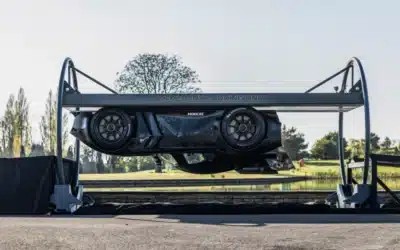In July, the United Arab Emirates announced an ambition to see 42,000 electric cars on its roads by 2030, and 50% of the cars on its roads to be EVs by 2050 along with 25% to be plug-in hybrids (PHEV). The rest would be comprised of Internal Combustion Engine cars (ICE) but also those powered by Compressed Natural Gas (CNG) and Hydrogen.
Further targets include making 70% of public transport buses electric with 15% being PHEV, this would be alongside 10% of trucks being PHEV and 40% hybrid. Around 20% of the government agency fleet of cars are already electric.
As more drivers consider making the switch to EVs, it’s essential to address common misconceptions surrounding EV charging and infrastructure.
Charging Infrastructure
One of the most persistent myths is the belief that charging stations are scarce in the UAE. In truth, the UAE is actively investing in a robust EV charging network. Major cities like Dubai and Abu Dhabi have witnessed significant growth in charging stations, with both public and private entities contributing to their expansion.
In Dubai there are currently 370 Charging Stations with 680 actual charging points. The Dubai Electricity and Water Authority (DEWA) is taking steps to grow the city’s public charging facilities by 170% in under three years with as many as 1000 Charging Stations.
A partnership between Regeny and EVGateway was announced in January with promises to deploy 10,000 EV Charging Networks by 2030, along with the establishment of EG20, which is an ADNOC and TAQA joint venture to create more charging stations.
With the ambitious plans to convert road traffic, both commercial and domestic to electric, as stated above, the commitment to dramatically increasing charging facilities is reassuring to drivers contemplating switching to an EV.
There’s no need to wait though, already the UAE has been ranked 8th in the Global Electric Mobility Readiness Index 2022 (the first GCC country in the top 10). Currently, the country has one of the biggest charging-station-to-vehicle ratios in the world.

One of the DEWA charging stations in the UAE.
Charging Speeds
Another misconception revolves around the perceived sluggishness of EV charging. Modern EV chargers, especially fast chargers, can replenish a significant portion of the battery’s capacity in a relatively short time. The UAE’s charging infrastructure includes various levels of charging, from standard AC charging to high-speed DC fast charging.
For example, DEWA Green Chargers including 22kW AC public or Wall Box chargers; 43kW AC or 50kW DC Fast Chargers; and 150kW DC Ultra-Fast Chargers. Meanwhile Yas Island already has superfast 350kW Chargers, and you can expect to more of them rolled out quickly.
Home Charging
It’s widely thought that living in an apartment or not having a personal garage or driveway makes home charging impossible. However, solutions are available. For example, many residential complexes in the UAE are installing communal charging stations, enabling apartment dwellers to conveniently charge their EVs (ask about these before you move building). Additionally, several charging providers offer home charging solutions that cater to diverse living situations.
For those that live in a villa or house, several providers such as Charge2Moov can install home EV chargers which means the cost of charging your car will simply be added to your monthly electricity bill.
Charging Costs
Talk of bills brings us to the question of running costs and more specifically charging costs. It’s often thought that EV charging is expensive, however running your car on electricity can work out to be considerably lower than traditional fuel costs.
Compared to other countries, the UAE’s favourable electricity tariffs make charging an economical option. Moreover, many charging stations offer free or discounted charging, further enhancing the financial benefits of EV ownership.
The average cost to fully charge a Tesla is about AED 30, by comparison filling up a Toyota Camry with petrol is likely to cost over AED 150. Even public charges can prove economical, with a typical cost being under AED 23 for 30 minutes at a 150kW Fast Charger.
Is the energy source clean energy?
Where is the power coming from? An EV is green, but is it green at source? By that we mean where is the energy coming from to charge the electric car, particularly pertinent in a country where oil and gas accounts for 30% of the total economic activity.
The UAE has a comprehensive strategy to manage the challenge and is rapidly growing the use of clean energy. Three nuclear power reactors feed power to the national grid, along with three of the world’s biggest and solar power plants.
The UAE goes further by being the first nation in the region to boast industrial-scale carbon capture technology, recognising and accepting that oil and gas will continue to be an important part of the global energy economy for some time to come. The carbon capture technology seeks to offset CO2 emissions.
As such, in the UAE, smart charging systems, renewable energy integration, and grid management technologies are being implemented to ensure a balanced and sustainable energy distribution.
Charge and go!
The UAE’s commitment to building an extensive charging infrastructure, combined with technological advancements, offers a promising outlook for EV adoption. So, there’s no need to hesitate: switch to an EV confident in the knowledge you’ll be able to plug and go!











